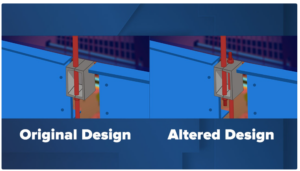
A fault in the altered design of skywalk bridges inside the Hyatt Regency hotel brought them crashing down on a crowd below on Melissa Mairs/KSHB. A fault in the altered design of skywalk bridges inside the Hyatt Regency hotel brought them crashing down on a crowd below on 7-17- 1981. Photo/Melissa Mairs, KSHB
Engineering Failures Education (EFE) is a public safety campaign to require all students in the U.S. who are working toward a Bachelors degree in Engineering to receive instruction on engineering failures and the lessons learned from those failures.
This campaign is needed because the engineering students of today will develop the technological solutions of tomorrow. The EFE campaign seeks to normalize teaching of engineering failures in our nation’s 200+ ABET-accredited engineering schools.
The EFE campaign will formulate a letter to the President of ABET that requests that ABET implement the necessary accreditation requirements necessary to meet that objective. This letter will come from a coalition of deans of ABET-accredited engineering schools throughout the US. The campaign envisions two or three high-profile deans acting as coalition leaders. The letter will recommend modifying an existing student outcome.
Student Outcome 4 currently reads:
- an ability to recognize ethical and professional responsibilities in engineering situations and make informed judgments, which must consider the impact of engineering solutions in global, economic, environmental, and societal contexts.
The letter will suggest this:
- an ability to recognize ethical and professional responsibilities in engineering situations and make informed judgments, which must consider the impact of engineering solutions in global, economic, environmental, and societal contexts and must demonstrate awareness of past engineering failures.
This letter––signed by at least twenty-five (hopefully many more) deans of the nation’s 200+ ABET-accredited schools––will have three appendices:
Appendix #1 List of engineers and experts nationwide in support.
Appendix #2 – List of nationwide organizations, societies, NGOs, nonprofits, agencies, etc who have submitted letters in support.
Appendix #3 – List of citizens-at-large nationwide in support. The online manifesto can be seen here.
The three appendices that will accompany the letter are useful because it’s well understood that ABET generally resists making changes to accreditation criteria.
In addition to a large showing of broad, diverse national support, we also envision coordinating the campaign with an ongoing informal initiative to address the current lack of regularly scheduled updates to ABET’s accreditation criteria. This lack of scheduled updates has previously been observed by engineering scholars. Coordination with this initiative is necessary, because ABET also resists piecemeal changes to its accreditation criteria. The leader of this initiative has not been identified yet. Thus, our letter to the president of ABET will request that our recommended change to Student Outcome 4 be implemented in conjunction with the next scheduled criteria update.




